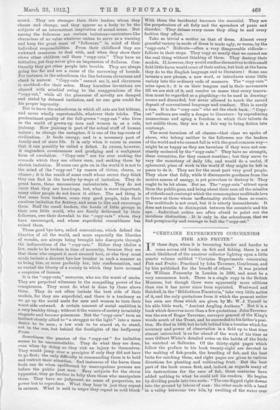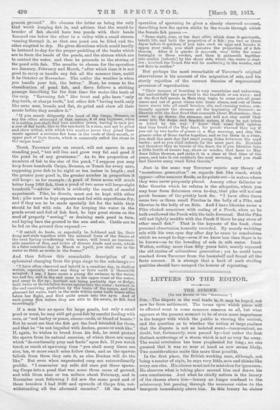" CERTAINE EXPERIMENTS CONCERNING FISH AND FRUITE."
IN these days, when it is becoming border and harder to come across old books on fish and fishing, there is not much likelihood of the amateur collector lighting upon a little quarto volume entitled " Certaine Experiments concerning Fish and Fruite: Practised by lohn Taverner, Gentleman, and by him published for the benefit of others." It was printed for William Ponsonby in London in 1600, and must be a. very uncommon book. There is a single copy in the British Museum, but though there were apparently more editions than one it has never since been reprinted. Westwood and Satchel!, in the "Bibliotheca.Piscatoria," take very little notice of it and the only quotations from it which the present writer has seen are those which are given by Mr. W. J. Turrell in his able little work, "Ancient Angling Authors." But it is a book which deserves more than a few quotations. John Taverner was the son of Roger Taverner, surveyor general of the King's woods south of the Trent, and he succeeded to his father's posi- tion. He died in 1606, but he left behind him a treatise which for accuracy and power of observation in a field up to that time almost untouched is as far ahead of the work of his time as were Gilbert White's detailed notes on the habits of the birds he watched at Selborne. Of the thirty-eight pages which follow the preface to his book twenty-eight are devoted to the making of fish-ponds, the breeding of fish, and the best baits for catching them, and eight pages are given to various directions for planting and cultivating fruit. But the beet part of the book comes first, and, indeed, as regards many of his instructions for the care of fish, three centuries have added nothing to what be could tell his readers. He begins by dividing ponds into two sorts "The one digged right downs into the ground by labour of man : the other made with a head in a valley betweene two bile, by swelling of the water over
grassie ground." Ho chooses the latter as being the only kind worth keeping fish in, and advises that the would-be breeder of fish should have two ponds with their heads dammed one below the other in a valley with a small stream sunning through it, so that one pond can be filled and the other emptied to dry. He gives directions which could hardly be bettered to-day for the proper puddling of the banks which are to form the heads of the ponds, and the sluices which are to control the water, and then he proceeds to the storing of the pond with fish. The months to choose for the operation are January, February and March, " after which time it is not good to carry or handle any fish all the sommer time, untill it be October or November. The colder the weather is when you handle your fish, the better." Next, he comes to the classification of pond fish, and there follows a striking passage describing for the first time the molar-like teeth of the carp. "Ravening fish" like trout and pike have "only dog-teeth, or sharpe teeth," but other fish "having teeth only like unto man, broade and flat, do grind and chew all their meate before they swallow it."
"If you search diligently the head of the Carpe, Bream°, or any the other aforesayd of that nature, & of any bignesse, when it is sodden you shall find two neather jawes, having in each jaw a row of flat teeth, like to the eye-teeth in a man, and apt to grind and chow withal, with which two neather jawes they grind their meate against a certaine fiat bone in the mole of their mouth, or upper part of their throte, which is commonly called the stone in the carpes head."
Trout, Taverner puts on record, will not spawn in any standing pool, " but will line and grow very fat and good if the pond be of any greatnesae." As to the proportion of numbers of fish to the size of the pond, " I suppose you may keep foure hundreth Carpe, Breame, or Tench for every acre, supposing your fish to be eight or ten inches in length : and the greater your pond is, the greater number in proportion it will keepe : as for example pond of fours acres will much better keep 1600 fish, than a pond of two acres will keepe eight bundreth "—advice which is evidently the result of careful experiment. Pike, he directs, must not be kept with other fish ; pike must be kept separate and fed with superfluous fry, and if they are to be made specially fat for the table they should be fed with eels. As for keeping the water in the ponds sweet and full of fish food, he lays great stress on the need of properly " sewing " or draining each pond in turn, and laying bare the ground to the sun and air. Cattle are to be fed on the ground thus exposed :—
" If cattell do feede, or especially be foddered and lie, their dung and stale together with the naturall force of the Senn° at the next Spring overflowing with water, will breed an innumer- able number of flies, and bodes of diverse kinds and sorts, which in a faire sunshine day in March or Aprill, you shall see in the water as thick as motes in the Srmne."
And then follows this remarkable description of an ephemeral changing from the pupa stage to the sub-imago :—
" I have often observed and beheld in a sunshine day, in shallow waters, especially where any dung or fate earth is therewith mingled: I say, I have seeno a young file swimme in the water, too and fro, and in the end come to the upper crust of the water, and assay to the up : howbeit not being perfectly ripe or fledge, bath twice or thrice fallen downe again into the water : howbeit in the end receiving perfection by the heate of the sunne, and the pleasant fat water, bath in the ende within some halfe houre after taken her flight, and flied quite aware into the .ayre. And of such young flies before they are able to file awe°, do fish feed exceedingly."
If a man has no space for large ponds, but only a small pond or moat, he may still get good fish by careful feeding with corn, or "sod barley or pease, cheese-curds, or blond of beasts:, But he must see that the fish get the food intended for them, and that he "be not beguiled with duckes, geesse or such like." If, again, he wishes to breed from his fish, he must protect the spawn from its natural enemies, of which there are many which "do continually pray and feede" upon fish. If you watch tench or roach at spawning time " you shall many times see size, ten, or more small eeles follow them, and as the spawn° falleth from them they eate it, as also Duckes will do the like." But even when unprotected carp are extraordinarily prolific. "I remember my self° did once put three spawn- ing Carps into a pond that was some three acres of ground, and with them nine or ten millers about February, and in November next following I did sew the same pond and of those breeders I had 9000 and upwards of Carpe frie, not- withstanding all the aforesaid enemies." Of the actual
operation of spawning he gives a closely observed account, describing bow the spawn sticks to the weeds through which the female fish passes :—
" Some eight, nine, or ten days after which time it quickneth, taketh life, and hath the proportion of a fish : yea two or three. dayes before it quicken, if you take such an egge and break° it nppon your naile, you shall perceive the proportion of x fish therein. After it is quieko it mooveth very little for some fortnight or three weedes, and then it gathereth together into sculles [schools] by the shore side, where tho water is shal- low : howbeit the Tench trio will lie scattering in the weedes, and not floto in smiles."
But perhaps the most remarkable of Taverner's original observations is his account of the migration of eels, and his sturdy rejection of the current theories of supernatural processes of reproduction.
"Their manner of breeding is very uncertaine and unknowne, but undoubtedly they are bred in tho brackish or sea water : and at the first full moone in Male they begin to come into all great riuers and out of groat riuers into lesser riuers, and out of these lesser riuers into all small brookes, rile, and running waters, eon-. tinually against the streams all the beginning of Sommer : as likewise with the first floud that commeth about Michaelmas, they collet to go downs the streams, and will not stay untill they come into the deepe and brackish waters, if they be not taken or lotted by the way. I know that some hold opinion that they breed of the May deaw, for proof° whereof they say if you cut up two turfes of grease in a May morning, and clap the, grassie sides of those turfes together, and so lay them in a riuer, you shall the next day find small young Eeles betweeue the sayd turfes : and so you shall indeede for the most part do. Howbeit not therefore they do brooch) of the deaw, for if you likewise take a little bottle of sweete hay, straw or weedes, that have no May deaw fallen thereon, and sinke it in a riuer at that time of the yeare, and take it out suddenly the next morning, and you shall find likewise many small Eolos therein."
Just in the same way Taverner rejects any theory of "monstrous generation" as regards fish like roach, which appear—after summer floods, as he points out—in waters where they were never purposely placed. Among other fallacies or false theories which he refutes is the allegation, which you may hear from fishermen even to-day, that pike will not eat perch because of the prickly back fin. "I have often times seene two or three small Perches in the belly of a Pike, and likewise in the belly of an Eele. And I have likewise scene a Pike choked sometime with eating of a Perch, when as ho bath swallowed the Perch with the toile foremost. But the Pike will not lightly meddle with the Perch if there be any store of other small fish." That is the keynote of the book, close personal observation honestly recorded. By merely watching eels with his own eyes day after day he came to conclusions which we accept to-day—even if we know less than there is to be known—as to the breeding of eels in salt water. Izaak Walton, wilting more than fifty years later, merely repeated
the old stories of miraculous generation ; yet he could have reached down Taverner from the bookshelf and found all the facts correct. It is strange that a book of such sterling qualities should have escaped the honour of reprinting.







































 Previous page
Previous page